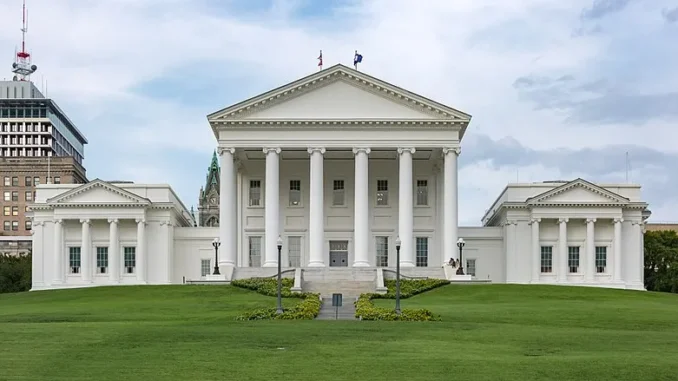
Virginia clean energy champions have their fingers crossed that members of a resurrected legislative commission won’t water down four utility-focused bills when they meet in the off-season to reshape the failed measures for next year’s General Assembly.
The rebooted Commission on Electric Utility Regulation, created to provide Virginia’s legislators guidance on increasingly complicated energy bills, is so new that it’s still hiring an executive director and other staffers.
The commission won’t meet until after the session adjourns on March 9, but the list of bills it is expected to review is growing. Thus far, it includes House Bill 792, designed to prevent investor-owned utilities from adding expenses for lobbying and other political activities to ratepayers’ monthly bills.
Also on the commission’s agenda are two separate bills attempting to boost competitive, third-party bidding on solar and offshore wind projects.
A fourth — and probably not final — piece of legislation seeks to require utility regulators to enact energy policy at the lowest reasonable cost. Details are outlined in SB 137 and its companion, HB 976.
Senate Majority Leader Scott Surovell, D-Mount Vernon, led the charge to revamp the long-dormant commission last year and budget money to hire a professional staff. He was frustrated that lawmakers, who all serve part time, counted solely on input from industry lobbyists and environmental advocacy organizations while shepherding Virginia’s transition to clean energy.
Its 13 members — three policy-savvy citizens and 10 legislators — are tasked with figuring out how stalled bills can be fixed and advanced.
Liz Veazey, the policy and rural energy director for the nonprofit Solar United Neighbors, understands the potential value of advice from a neutral body.
“Energy legislation can be extremely complex, so legislators do rely on lobbyists for information,” she said. “But utilities have a lot more lobbyists than we do. It’s hard to overcome the power Dominion Energy has in the legislature.”
Solar United Neighbors is backing the bill to limit the use of ratepayer funds on lobbying and other political activities. Veazey said she’s hoping interactions with the new commission will convince legislators to embrace accountability and transparency guardrails outlined in the measure.
Briefly, in addition to blocking Dominion and Appalachian Power from charging customers for lobbying government officials, the bill also would bar collecting money from customers for trade association dues, issue advertising, charitable giving and litigation to challenge laws and regulations.
The bill, sponsored by freshman Del. Rozia “J.R.” Henson, a Democrat representing counties in Northern Virginia, spells out that the two utilities would have to fund those activities with dollars that otherwise would have been returned to investors as profit.
“Ratepayers shouldn’t be covering these costs when investor-owned utilities use some of that money to lobby against solar and fight against our interest in clean energy,” Veazey said. “We’re not saying the utilities can’t participate in these activities … but they should be using shareholder money instead of ratepayer money.”
Over at the Southern Environmental Law Center, staff attorney Josephus Allmond has faith that the new legislative utility commission can dislodge sticking points that stymied progress on the Affordable, Reliable and Competitive bill (House Bill 638, Senate Bill 230) earlier this month.
The legislation’s goal is to elevate the role of customers and private developers in meeting the state’s clean energy targets via less expensive, third-party solar and onshore wind projects in Dominion and Appalachian Power service territories.
“During a two-month legislative session, it’s difficult to get all the information out there,” Allmond said. “The extended forum of the commission allows us to get our data out there and make our case, and then for the opponents to rebut it.”
As the commission adapts and grows, it can “do legislative committees’ homework in the off-season,” he added.
At issue with the competitive procurement bill this session was how many third-party projects the utilities would include in their renewable energy portfolios. After legislators green-lighted the bold Virginia Clean Economy Act in 2020, regulators capped them at 35%. Proponents of the original legislation called for that 35% to act as a floor instead of a ceiling. Utilities balked at the initial bill, but pushed back vociferously when that figure was bumped up to 45% in a substitute bill.
The two sides also sparred over how quickly to forge ahead with a provision for a fivefold increase in the percentage of distributed energy generated by small-scale solar and solar storage projects.
Solar installers are on the verge of exceeding the 1% renewable portfolio limit included in the state’s clean energy law because of customer demand for closer-to-home energy. Bumping that upward to 5% is an incentive to let Virginia veer away from a more costly utility-only approach.
“I don’t think we are worlds apart in our negotiations,” Allmond said. “We have room to come together.”
While he isn’t clear on every procedural detail, he’s hoping that suggestions the commission forwards to the relevant committees can be a starting point for legislation next January.
“Legislators might be more comfortable with recommendations vetted by the commission,” he said.
Relatedly, on the offshore wind front, advocates are encouraged that a version of Senate Bill 578 has the potential to re-emerge next year. It was designed to enable private developers to compete with Dominion on offshore wind procurement for projects serving Virginia.
The Senate Commerce and Labor Committee’s decision to quash it in late January followed intense lobbying from Dominion to protect its monopoly.
Democratic Sen. Creigh Deeds, the bill’s sponsor and commerce committee chairman, had joined advocates in claiming that such competition would provide a swifter, cheaper, more transparent, and less risky path to meet or exceed the target of 5,200 megawatts of offshore wind by 2032 outlined in the four-year-old Virginia Clean Economy Act.
“We hope that Virginia’s Commission of Electric Utility Regulation will give these issues careful review later this year, ” Evan Vaughan, executive director of the Maryland-based Mid-Atlantic Renewable Energy Coalition Action, said in an interview.
Surovell, of Northern Virginia, chairs the revamped commission, and Del. Terry Kilgore, who represents the state’s Southwest, also serves on it. The Republican sponsored the House companion bill. Appointed citizen members are required to have expertise in economic development, energy affordability and public utility regulation.
Charlottesville-based Clean Virginia, which focuses on utility transparency, is a strong proponent of the legislation to limit political spending by investor-owned utilities.
Deputy director Cassady Craighill said her organization is grateful legislation led by Surovell last year “gave the commission more teeth” because bills before it are likely to be revived in some fashion instead of being tossed away.
“Yes, it would have been better for House Bill 792 to pass this year,” she said. “But we’re looking at its commission review as a conversation-starter.”
It’s possible, she noted, for the proposal that re-emerges from Surovell’s commission to be just as robust as the original while also more palatable for lawmakers.
“With any legislative proposal to change the way utilities are regulated, it’s very difficult to introduce it and have it pass in the same year,” Craighill continued, adding that it’s not surprising hurdles arise even when Democrats control both legislative chambers. “Utilities are different from other industries so historically there has needed to be some sort of study done first.”
A Dominion spokesman didn’t weigh in for or against the bill.
“All the political activities listed in HB 792… are already excluded from our rates and are funded by shareholders,” Aaron Ruby said.
However, he also said the measure “goes much further than political activity” excluding “routine business expenses like travel, litigation, etc.”
Ruby was referencing prohibited activities the bill outlines, such as “travel, lodging, or food and beverage expenses for the utility’s board of directors or officers” or “leasing, owning, or chartering an aircraft for the utility’s board of directors or officers.”
Bill proponents not only disputed Ruby’s claims, but provided evidence that current safeguards were being violated.
Kendl Kobbervig, advocacy director at Clean Virginia, pointed to research by the nonprofit utility watchdog Energy and Policy Institute revealing that Dominion and Appalachian Power sought to charge their customers a combined $10 million in various trade association dues in recent rate cases. Dominion’s share of that dues total was $9 million.
For instance, Dominion wanted customers to pay for $1.3 million to the Edison Electric Institute, which represents investor-owned electric companies. Appalachian Power sought at least $500,000 in dues for the same institute from its Virginia customers.
The Washington, D.C-based trade group has a long record of fighting clean energy policies as well as environmental and public health rules.
“It’s inappropriate for utilities to pass expenses on to customers for trade associations like the Edison Electric Institute that turn around and lobby against climate policy,” Kobbervig said.
Virginia’s State Corporation Commission is tasked with regulating monopoly utilities and establishing fair rates. The regulatory body began excluding lobbying costs from customer bills for all utilities in 1984, spokesman Andy Farmer said. In 2018, regulators followed suit with charitable donations.
Despite those rulings, state regulatory auditors have removed close to $10 million from customers’ bills in political or related costs in four rate cases dating back a decade, said Kobbervig, referring to data gathered by the California-based Energy and Policy Institute.
For instance, she pointed to a state audit of a recent Dominion rate case. Utility regulators combed through paperwork to identify $306,000 in charitable contributions and lobbying expenses that Dominion improperly placed in what are called above-the-line accounts.
Kobbervig noted that Dominion also tried to charge customers $5.7 million for charitable contributions and lobbying expenses in a 2021 triennial review, $45,000 for industry dues connected to lobbying in a 2015 biennial review, and $3.9 million for advertising costs in a 2013 biennial review. All those reviews are connected to rate cases.
Those “would have been included in Dominion’s customers’ bills if not for the audit,’ she said. “That is part of a longstanding pattern for Dominion.”
While HB 792 called for barring utilities from recovering advertising costs from customers, Virginia has had that restriction on its books since at least 1996, according to state code.
Delving into Appalachian Power’s 2023 rate case, the Energy and Policy Institute documented that the utility tried to charge ratepayers $926,000 in lobbying activities, advertising expenses and the lobbying portion of industry association dues.
“Right now, we’re relying on SCC staff to catch all of this,” Kobbervig said. “But is that really the way this should be handled?”
State Corporation Commission staffers conduct regulatory audits of a utility’s application for a rate increase, Farmer said. Part of that review includes verifying that costs for lobbying, charitable donations and lobbying aren’t being charged to customers.
“If we discover (they are), then we propose a regulatory accounting adjustment to exclude the costs,” he said. “There are no fines proposed or assessed on the company.”
One crucial piece of HB 792, advocates agreed, would have allowed state regulators to fine utilities for charging customers for prohibited political activities.
Equally important, they said, is a provision requiring utilities to file annual itemized reports clearly stating what charges ratepayers are expected to cover. In addition, the companies would have to list job titles of employees involved with lobbying, trade associations, charity, political litigation and advertising, along with what percentage of their salaries the utilities are seeking to recover from ratepayers.
“Electric utilities have been given monopoly structure and we need to hold them accountable,” said Veazey, of Solar United Neighbors. “What’s important is transparency.”
Whatever becomes of the bill, Virginia’s attempt to clamp down on utilities isn’t the first. Colorado, Connecticut and Maine adopted similar measures last year.
In neighboring Maryland this session, legislators are considering the Utility Transparency and Accountability Act. As well, proposals are pending before legislators in California, Illinois, Massachusetts, New York and Ohio.
“These efforts across the country tie into preventing utility shenanigans,” Veazey said. “If utilities have all of this money to spend on public relations or lobbying, you could argue that they could lower people’s bills or do more to advance clean energy.”



